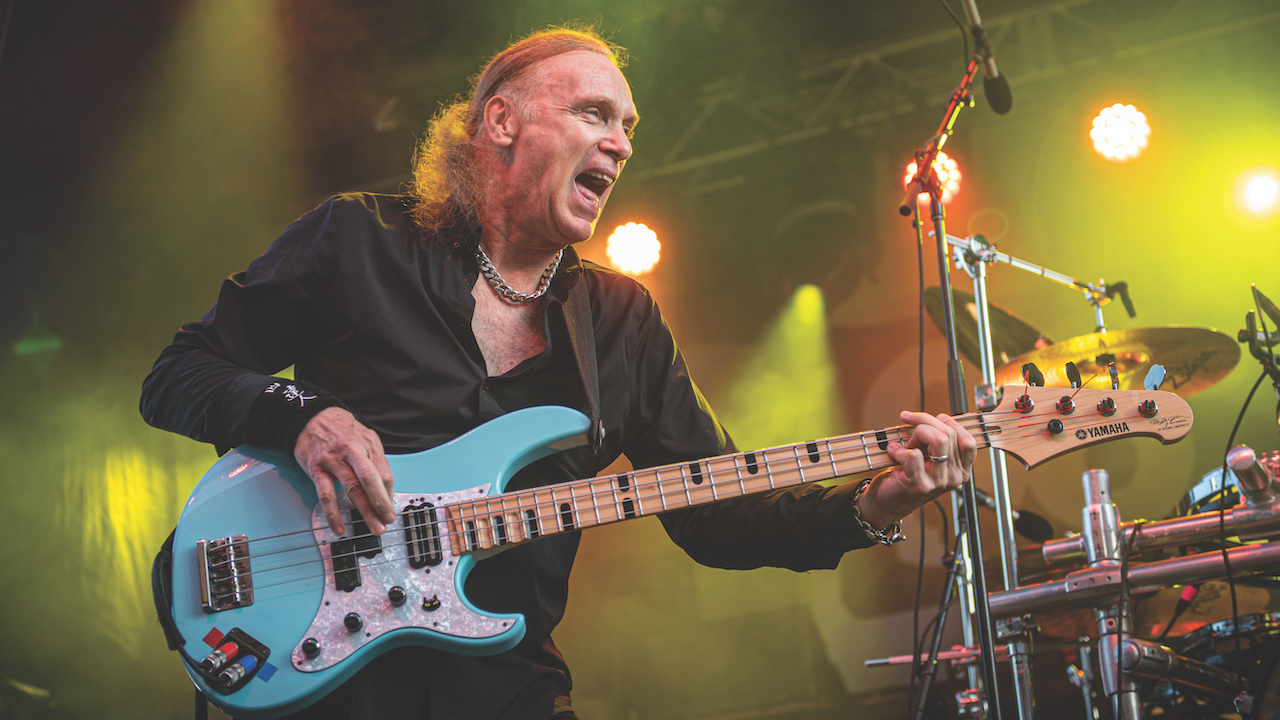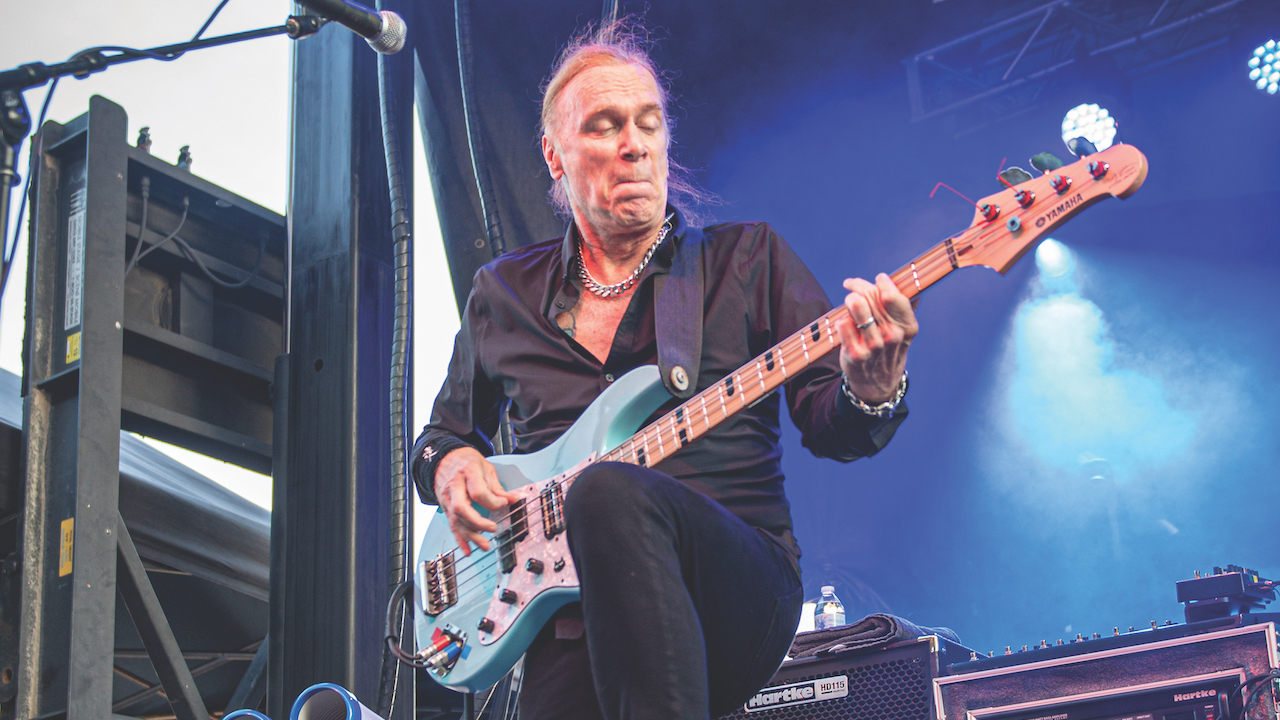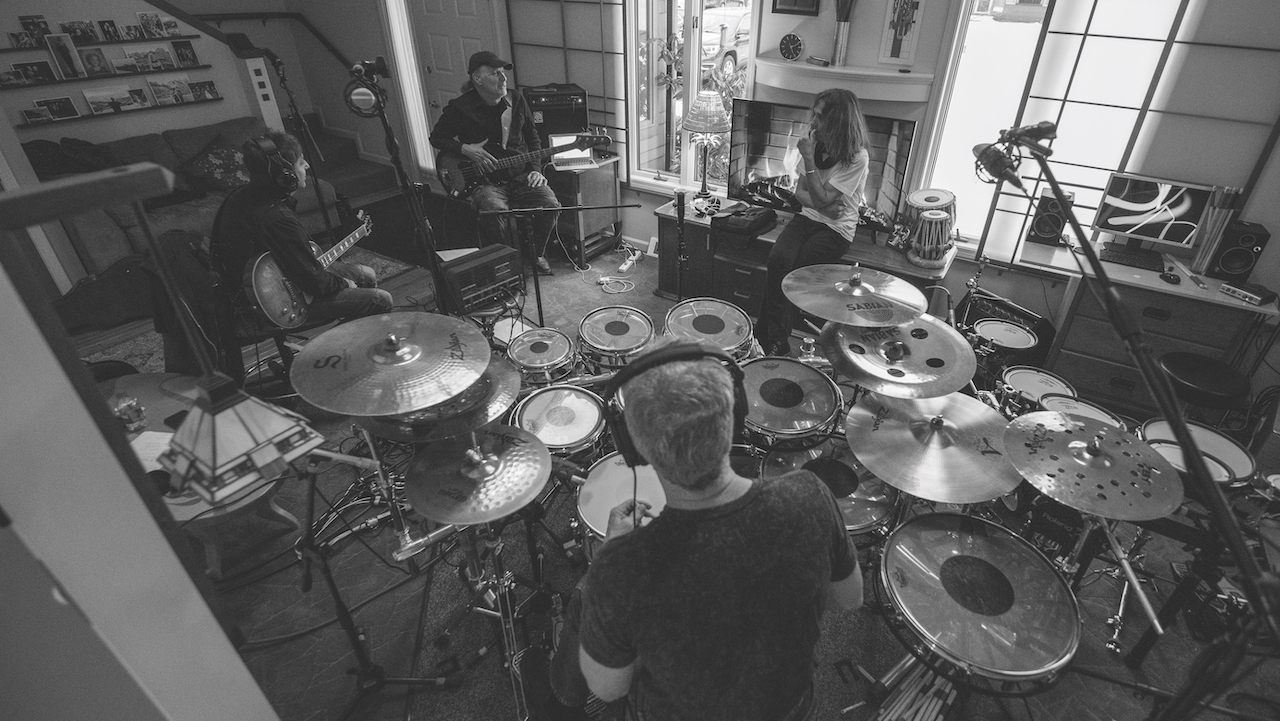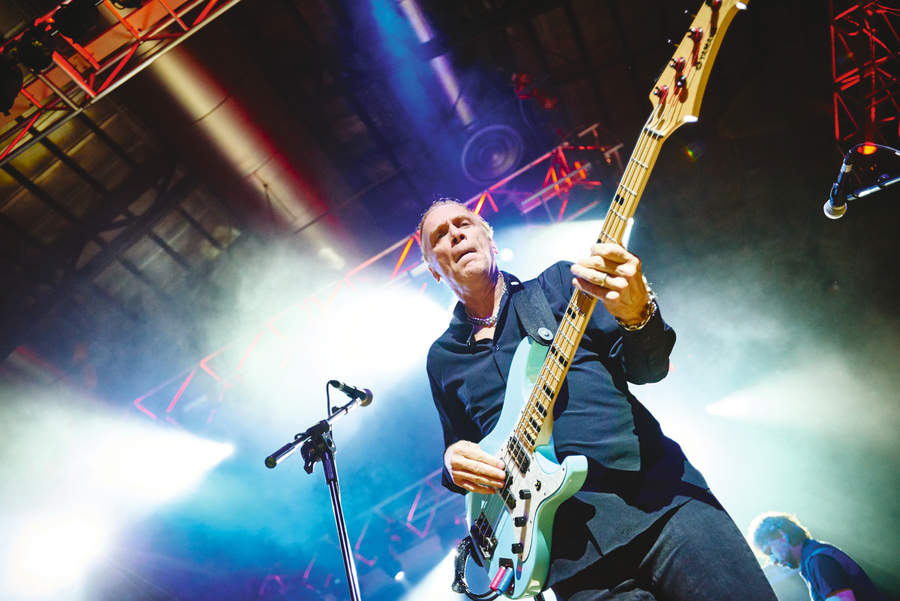Billy Sheehan began his career with Talas. Over 40 years on, he returned for a new album tinged with tragedy
"They photocopied my P-bass!" Billy Sheehan on "The Wife" and the tragedy and triumph of the new Talas album, 1985

1985. For many of us, just thinking of that distant year conjures up images of flamboyantly attired metal bands, musical extravagances – and time-travelling DeLoreans. For bassist Billy Sheehan, it was a pivotal year, one in which he bade farewell to his bandmates in Talas and took up his position as a sideman to David Lee Roth, one of the greatest performers of his generation.
Talas were an integral part of the early-Eighties hard rock scene. Working the Buffalo, New York bar circuit, hoping for the breakthrough that never quite came. Now, 37 years later, Billy has reunited with his old bandmates to release 1985, a newly recorded album consisting of material that was written with the band's line-up from back in the mid-Eighties. The album also stands as a moving tribute to vocalist Phil Naro who sadly died in 2021.
“Five years ago, I played a show with that version of Talas – and I say that because through the years there’s been eight or nine different versions of the band,” says Sheehan. “The two that most people knew were the trio that did the Sink Your Teeth Into That album in 1982, and another version after that with the line-up of this new album.
Do we modernise everything, or do we jump in a time machine back to 1985 and do it like it was back then?
"We’d always wanted to do something since I left in 1985. Back then the band was in great shape, we were doing great business everywhere, and we scored a major record deal just at the point that I left.
"So, five years ago we played a free show at an outdoor festival in Rochester, New York. We had a riot rehearsing and performing the show, just a real blast. We didn’t have Mitch Perry or Johnny Angel on guitar, but Phil [Naro, vocals] suggested a friend of his named Kire Najdovski who came in and did a great job.

A run of further shows followed, with the band eventually deciding to head into the studio and pick up where they had left off back in 1985. “We had two paths that we could have gone down,” says Sheehan. “Do we modernize everything, or do we jump in a time machine back to 1985 and do it like it was back then? We all said, let’s do it like it was back then!”
But how does a band revisit material from over 30 years ago? Fortunately, Sheehan is a passionate archivist, and in recent years had unearthed a huge mass of old material. “I’ve got everything!” he laughs. "A hundred or so live shows going back to 1973, every version of those old songs, old bass ideas, old song ideas that I wrote that were thankfully forgotten about...”
With these recordings as a reference, the band was able to recreate the material as it was back then. “We barely changed a thing, maybe a lyric here and there, and we were able to go back and listen through different versions. In fact, one song – The Power To Break Away – originally didn’t have a bridge, but we’d added one in some of the later versions. So we decided to keep it in – it was written back then anyway, so it fit with our criteria.”
Basic tracks were laid down in drummer Mark Miller’s living room, with Billy recording his final bass tracks later. Unfortunately, when it came to laying down Phil Naro’s vocals, it became evident that the singer was dealing with some health issues. “Phil had to sing in Toronto because he couldn’t do much travelling at the time,” says Sheehan.
After the record was finished it became obvious that something was wrong
“We weren’t really sure what was going on, but we knew he was dealing with something, so we did it remotely. We used a program called Audio Movers to record, and then we just used FaceTime for the talk-back. Of course, it would have been better all to be in the same room, but it worked really well, Phil really stepped up and did a wonderful job.
"After the record was finished it became obvious that something was wrong, and he needed to go into the hospital.”
Get The Pick Newsletter
All the latest guitar news, interviews, lessons, reviews, deals and more, direct to your inbox!
Naro didn’t live to see the album release: he passed away on May 3, 2021, following a struggle with cancer.

Inner Mounting Flame kicks off the new album, a galloping monster of a track that hardcore Talas fans will recall from the 1984 live album Live Speed On Ice. I put it to the great man that the opening riff is classic Sheehan. “One of my pentatonic monster scale riffs,” he says.
My three biggest pieces of advice these days are get yourself in a band, get in a band with songs, and get in a band with songs that you sing.
‘”Mark and I were huge fans of Mahavishnu Orchestra, so I wrote that song as a tribute to that new kind of fusion, where the jazz guys were starting to burn through Marshalls, which was a new thing at the time. That music just seemed unattainable to begin with, but for me, it revitalized the challenge of pushing for things that initially seem out of your range.
"That still happens to me now: I hear some pieces of music and think ‘Where do I even start?’ But you just get to work. Anyway, Mahavishnu had an album called Inner Mounting Flame, although there was no song with that title. But it was written as a tribute to guitarist John McLaughlin, the Mahavishnu Orchestra, and that album.”
Long-time fans of Sheehan’s playing will find plenty to enjoy on the new record, but I wonder how the tunes might have sounded if they had been recorded back in 1985. Would he have approached them differently?
“Yeah – they probably would have been wilder!” he chuckles. “They would have been much more unleashed, but I learned so much when I joined David Lee Roth’s band, it was like a getting a PhD in showbiz and music production. When we did Eat ’Em And Smile in 1986, we had Ted Templeman producing. What a brilliant guy – and I think that if Talas had gone into the studio with a producer like that, things would have been fine-tuned.”
I joined David Lee Roth’s band, it was like a getting a PhD in showbiz and music production.
“But with Dave and also later with Mr. Big, I began playing for the song," he says. "It was the same thing with the Tony McAlpine record that I did [Edge Of Insanity, 1986]. That was a big stepping stone for me because it was really challenging music, but I still had to color between the lines in order to make it work. That was a great experience for me, so on this record I tried to abandon some of that approach and do it the way it used to be. I think I landed somewhere in the middle. Certainly, being back with those guys brought some of that spirit back, and we’ll see what people feel when they hear it.

“But I’m pleased with the album as a collection of songs, as opposed to it being something purely for me, and I think that back in the day I didn’t always think of the bigger picture.
"Once I learned to do that, it made a big difference, and I’ve given that advice to a lot of young players. In fact, my three biggest pieces of advice these days are: get yourself in a band, get in a band with songs, and get in a band with songs that you sing. Those three ingredients have been part of some of the greatest music ever.”
1985 closes with 7IHd h, a bass solo piece. “Upside down it says ‘4 Phil’,” says Sheehan. “It was recorded after he had passed away, because I wanted to do something for him. Back on Sink Your Teeth Into That I had a bass solo called ‘NV43345’, which is ‘Sheehan’ upside down, and on the live album I did ‘7718 (3A17)’ which was ‘Live Bill’ upside down, so I thought I’d keep that tradition. I also did a little heartbeat at the end, on the string against the pickup.”
A lot of Talas fans would love to see reissues of the band's older material, much of which remains notoriously difficult to track down.
“We should! I’d love to,” says Sheehan, “because I’ve got the archives. I have outtakes, versions with no vocals, and different versions of some of those songs, so I could put together some kind of package, possibly as a download.
"I may even talk to the engineer we worked with – a wonderful guy named Russ McKay – and see if he can find the original multitrack tapes, then we could release some isolated bass tracks or whatever. I guess that might end up being a 40th anniversary thing – that’s how long ago it was...”
One thing that hasn’t changed in the intervening years is Billy’s instrument, and his approach to it. Although Yamaha has released various iterations of the Billy Sheehan Attitude bass, the instrument is fundamentally the same as Billy’s old, heavily-customized P-Bass, affectionately known as ‘The Wife’. That consistency is key to Billy’s approach.
We took that original P-Bass and laid it face down on a photocopy machine so we could get the exact distances and angles between everything.
“For me it is,” he agrees. “Once I’ve got something down, I don’t need to pay attention to it any more, because I know it’s right. If there’s anything wrong, anything I can’t do, it’s down to these 10 fingers. Part of that also comes from playing clubs night after night, with the same gear, the same speakers, the same thing each time. Every night there might be little nuanced changes: if there are more or fewer people in the room, it sounds different and it feels different. All those elements affect how I play, so I wanted to have one thing that was always consistent – this bass, with these pickups.
“We took that original P-Bass and laid it face down on a photocopy machine so we could get the exact distances and angles between everything," he says, "so the basses that I play now are an exact duplicate of the original. I’ve never been asked about that before – and I’m glad you did, because some people can pick up any old bass and do their thing, but that doesn’t happen to be me.
"I’ve heard that Jeff Beck could take a Strat out of a guitar store and walk up on stage and play it, which is pretty cool. I could get through the night that way, but it wouldn’t be my finest hour, that’s for sure!’

With much of Sheehan’s career based around live performance, it was inevitable that the conversation turned to the pandemic, and the adjustments all musicians have had to make. Fortunately, he was able to turn to online sessions.
"I recorded almost 400 tracks, and I’m supremely grateful to all of my clients for getting in touch and having me play on their records. It’s been a godsend, and a great experience too, because I’ve played everything from country and dance music to death metal, prog, jazz, classical, you name it. It really was a great experience to adapt myself to these really disparate styles of music.
“I’ll turn 70 next March," he says, "but I’m still excited about playing. I always have my phone with me when I’m practising, and if I come up with something, I record it and explain into the camera what I’m doing. I have hundreds of those. I’ve been working really hard on new techniques, but also rediscovering some things that I used to do – which is another benefit of going through the archives. Sometimes I don’t know how things will translate to my live playing, because for me, there’s a wide gap between practising and performing, as far as what you can pull off.
I’ve been working really hard on new techniques, but also rediscovering some things that I used to do – which is another benefit of going through the archives.
“Another caveat I would like to give to younger players is not to be discouraged if you get up on stage and you can’t replicate what you’ve been doing at home, when you’re sitting down in a totally controlled situation. I haven’t played a gig in a while, so I’ve purposely increased the amount of energy I’m putting into my playing in order to mimic a live performance. I have an amp out in my garage, and I go out there and play almost for real through an amp, so I’m closer to being able to do all the things I’m coming up with in a live situation. We shall see!’
As well as the Talas album, Sheehan has also completed work on a new album with the Winery Dogs, the trio he formed with ex-Dream Theater drummer Mike Portnoy and ex-Poison and Mr. Big guitarist Ritchie Kotzen. “The new album just got mastered,” he says. “We’re all really excited about it: I love playing in that band. But I also did a show with Niacin recently [with drummer Dennis Chambers and B3 organist John Novello], and we’re thinking of doing more of that, too.”
As Sheehan steps out of his time machine and turns his attention to the Winery Dogs and beyond, we at Bass Player magazine can reflect on our own journey, which – amazingly – has spanned over 30 years. Billy was in our first print issue and our last: We're closing the book in the same way we opened it, in the company of one of the hardest working bassists in the business. And, like him, we're not stopping any time soon.










